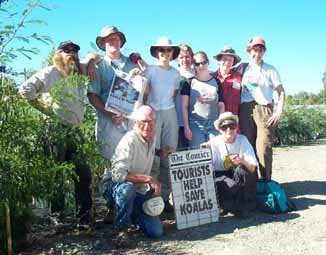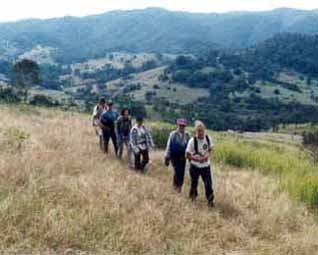Introduction
Since 1994 the Australian Koala Foundation (AKF) has provided opportunities for a select group of participants to work with our research staff and contribute personally to the koalas long term survival. We have run 27 research field trips in this time and we are now coordinating restoration field trips to restore habitat directly with the help of participants from around the world.
The Australian Koala Foundation, based in Brisbane is a national (and international) organisation that works to save koalas throughout their entire range of habitat, so you can work with us in a wide range of locations.
Our field trips cater for people with different levels of fitness and backgrounds. AKF field trips cover many facets of koala conservation.
How do Research & Restoration Field Trips help save koalas?
These field trips contribute to koala conservation on several levels:
- Research into koala habitat enables the Australian Koala Foundation to conserve koala populations more effectively
- The planting of new koala food trees and habitat trees bolsters a region's capacity to support koalas
- The mapping of koala habitat facilitates the protection of that habitat from future development and provides important information to decision makers
- Your share of the costs makes it possible for the AKF to continue its valuable work
- Participants learn about koalas, conservation and environmental responsibility through hands-on involvement. Experiential education is never forgotten and inspires people to encourage others to make a difference.
Our research team consists of experts in a diverse range of scientific fields including wildlife biology, botany, ecology and fauna surveying. The aim of the field trips is to gather information and data relating to koala populations and koala habitat. The data that is captured from these trips is used by the AKF to further develop the Koala Habitat Atlas – a unique and specific tool that maps koala habitat in fine detail. Research Field Trips can be physically demanding. Arduous bush walking is often necessary to gain access to study sites. You will visit areas seldom visited by people and experience the real Australian bush on foot. Your participation in a Save the Koala Research Field Trip, will help koalas by contributing to projects that protect their habitat for the long term.
Restoration Field Trips are designed for people who like to play a positive, productive part in conservation. Tasks include preparing ground, weed control, digging holes, planting trees, follow up maintenance and watering of trees, fencing and general clean up work. Restoration of koala habitat is vital in fragmented and isolated landscapes. Many koala populations are surviving in remnant areas of poor habitat quality as primary habitat mostly existed on the more fertile soils which are now used for farming and residential areas. Restoration and expansion of primary habitat is the goal of Save the Koala Restoration Field Trips. By participating in a Save the Koala Restoration Field Trip, you will help koalas in a very direct way by improving and expanding their habitat.
What to expect
The Australian Koala Foundation is the primary koala conservation organisation in the world. It is a non-profit, non-government entity whose objective is the long-term preservation of koalas and their habitat in the wild. These field trips enhance our conservation work, give people a hands-on koala experience and generate funds to allow us to continue our work. On a Save the Koala Research or Restoration Field Trip you will work in the Australian bush with experienced AKF staff including scientists, koala experts and habitat restoration enthusiasts.
We have taken groups of volunteers on 23 two-week field research trips since 1994 and our staff are adept at safely guiding a wide variety of volunteer workers through the bush to work hard collecting scientific data. We have expanded that goal to rehabilitating and restoring the koala's environment. We are koala conservation experts who are good at showing volunteers a fun and informative time in the bush in return for some of your hard work and effort.
One day you may find yourself hiking through spectacular Eucalypt forests chatting with field ecologists about the Feather-tailed Gliders you saw the night before and the next you may be standing on a mountain top admiring a perfect sunset with a group of newly made friends.
Team members come from a variety of countries and a wide range of backgrounds including zookeepers, land managers and other professionals, researchers, university students and interested people. Participants usually share a fascination for wildlife, conservation and the Australian bush.
No qualifications or past experience are required apart from enthusiasm and a certain level of fitness. Your project leader will teach you everything you need to know to participate in the field trips on offer.
There is usually at least one group barbeque night during fieldwork and one day off to enjoy the local sights and relax. Where possible a visit to a wildlife carer in the local area is arranged for an introduction to the important job of looking after sick, injured and orphaned native animals.
Save the Koala Research Field Trips and Restoration Field Trips are for active and adventurous people who want to make a difference to the world and get their hands dirty doing it.
Previous participants comments
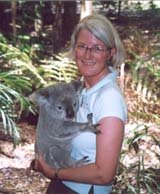 I've travelled in Australia before, but this time it was different and special because part of my trip was a fieldtrip in the Southern Tablelands of New South Wales, organised by the AKF. As I've loved koalas since I was young, it was great to have the opportunity to contribute to koala conservation in another way than just donating money. Walking in huge eucalypt forests, in the middle of nowhere with the minty smell of the eucalypts, is something special for a person like me, living in busy Amsterdam, full of traffic and pollution. It was really great and I've learned a lot more about koalas and koala conservation! Thank you for the nice company, the great accommodations in remote and beautiful areas where I'd have never travelled to by myself. You showed me another Australia! I sincerely hope many people will help the AKF to continue this very important work for the benefit of the koalas but also for Australia itself. It is certainly worthwhile! Veronique Kuijer, The Netherlands
I've travelled in Australia before, but this time it was different and special because part of my trip was a fieldtrip in the Southern Tablelands of New South Wales, organised by the AKF. As I've loved koalas since I was young, it was great to have the opportunity to contribute to koala conservation in another way than just donating money. Walking in huge eucalypt forests, in the middle of nowhere with the minty smell of the eucalypts, is something special for a person like me, living in busy Amsterdam, full of traffic and pollution. It was really great and I've learned a lot more about koalas and koala conservation! Thank you for the nice company, the great accommodations in remote and beautiful areas where I'd have never travelled to by myself. You showed me another Australia! I sincerely hope many people will help the AKF to continue this very important work for the benefit of the koalas but also for Australia itself. It is certainly worthwhile! Veronique Kuijer, The Netherlands
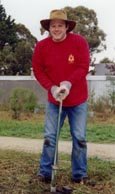 Definitely an original and entertaining experience. Having met up with the guys and the girls in Melbourne – complete strangers – I wasn't sure what to expect. As it turned out, we all had a great time and did things that you wouldn't normally do on a holiday in Oz – being interviewed for an article in a paper was a first! There were quite a few experiences that were really enjoyable – holding a koala, meeting and working with the guys in Ballarat and Terang as well as the sightseeing, which was built into the trip. Of course, nothing is ever perfect, and the leeches in Framlingham Forest had a field day on us. It made for some good photos though. All in all, it was a great holiday. Plenty of sunshine, good company, good food and something that turned out to be a lot more fulfilling than the usual tourist holiday on the East Coast (that came later in my case). Hopefully, I'll be back in Oz in a few years' time to renew acquaintances. Marshall Abrahams, Britain
Definitely an original and entertaining experience. Having met up with the guys and the girls in Melbourne – complete strangers – I wasn't sure what to expect. As it turned out, we all had a great time and did things that you wouldn't normally do on a holiday in Oz – being interviewed for an article in a paper was a first! There were quite a few experiences that were really enjoyable – holding a koala, meeting and working with the guys in Ballarat and Terang as well as the sightseeing, which was built into the trip. Of course, nothing is ever perfect, and the leeches in Framlingham Forest had a field day on us. It made for some good photos though. All in all, it was a great holiday. Plenty of sunshine, good company, good food and something that turned out to be a lot more fulfilling than the usual tourist holiday on the East Coast (that came later in my case). Hopefully, I'll be back in Oz in a few years' time to renew acquaintances. Marshall Abrahams, Britain
 I just had a great time. While planning my three months trip to Australia I felt that I needed a good, already planned start, to make me feel more comfortable and confident for the rest of my trip – and I couldn't have found anything better. I felt welcome the first minute I met all these great people from all over the world. I learned a lot about different cultures, nature, trees and especially Koalas. We planted a lot of trees, but never forgot to have great fun while doing it. And spare time was never boring either barbequing, going to the pubs, watching sunsets and stars. In case you are looking for something to do, where you have fun and do something special for nature, this is it. Bianca Barczaitis, Germany
I just had a great time. While planning my three months trip to Australia I felt that I needed a good, already planned start, to make me feel more comfortable and confident for the rest of my trip – and I couldn't have found anything better. I felt welcome the first minute I met all these great people from all over the world. I learned a lot about different cultures, nature, trees and especially Koalas. We planted a lot of trees, but never forgot to have great fun while doing it. And spare time was never boring either barbequing, going to the pubs, watching sunsets and stars. In case you are looking for something to do, where you have fun and do something special for nature, this is it. Bianca Barczaitis, Germany
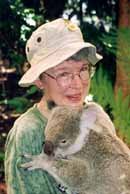 I would like to thank you for the unparalleled experience of working to save koalas with such a wonderful and diverse group of people. You made it both fun and educational and I was greatly impressed with your high degree of professionalism applied with a light touch. You made it possible to experience your country beyond the superficiality of most tourist experiences: to get personally involved with its people, its wildlife, and its problems. Mary Andrews, Victoria, Canada
I would like to thank you for the unparalleled experience of working to save koalas with such a wonderful and diverse group of people. You made it both fun and educational and I was greatly impressed with your high degree of professionalism applied with a light touch. You made it possible to experience your country beyond the superficiality of most tourist experiences: to get personally involved with its people, its wildlife, and its problems. Mary Andrews, Victoria, Canada
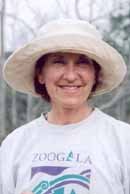 There are so many words to describe my very first experience with an AKF field trip in April 2002. However, the following four words nicely sum it up for me Efun, educational, rewarding and heart warming. Our field team consisted of six international volunteers Etwo from Canada, one from the U.S.A., one from Holland, and two from Germany. We were hosted, coordinated, managed and entertained by three knowledgeable, proactive and very personable representatives of the AKF EBill Fritz, Rolf Schlagloth and Dave Mitchell. I have the highest regard for all three of these individuals Etheir passion for their work in support of Australia's natural history is awe inspiring, to say the least. Kathleen Tolley, Calgary, Alberta, Canada
There are so many words to describe my very first experience with an AKF field trip in April 2002. However, the following four words nicely sum it up for me Efun, educational, rewarding and heart warming. Our field team consisted of six international volunteers Etwo from Canada, one from the U.S.A., one from Holland, and two from Germany. We were hosted, coordinated, managed and entertained by three knowledgeable, proactive and very personable representatives of the AKF EBill Fritz, Rolf Schlagloth and Dave Mitchell. I have the highest regard for all three of these individuals Etheir passion for their work in support of Australia's natural history is awe inspiring, to say the least. Kathleen Tolley, Calgary, Alberta, Canada
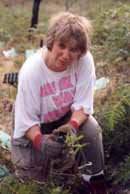 In April this year I had the opportunity to join the AKF restoration program in Ballarat/Framlingham where we planted a lot of trees and where we did some revegetation work. Besides these activities we learned about the difficulties the koalas have to deal with (loss of natural habitats, enemies, accidents, diseases, etc.) and the role of the AKF and its valuable work. During these two weeks I met some wonderful ladies from Canada, USA and Germany with whom I talked, worked, laughed and sometimes cried. Doing something good in my life in such a materialistic society, meeting local people and working with such dedicated people of the AKF were the ingredients of the most valuable experience of my whole life. Ingrid Wilming, Leeuwarden, The Netherlands
In April this year I had the opportunity to join the AKF restoration program in Ballarat/Framlingham where we planted a lot of trees and where we did some revegetation work. Besides these activities we learned about the difficulties the koalas have to deal with (loss of natural habitats, enemies, accidents, diseases, etc.) and the role of the AKF and its valuable work. During these two weeks I met some wonderful ladies from Canada, USA and Germany with whom I talked, worked, laughed and sometimes cried. Doing something good in my life in such a materialistic society, meeting local people and working with such dedicated people of the AKF were the ingredients of the most valuable experience of my whole life. Ingrid Wilming, Leeuwarden, The Netherlands
Frequently asked questions
Who are the project leaders?
Our projects are always led by Australian Koala Foundation staff with years of experience at leading field research teams in the Australian bush. They share an enthusiasm and passion for koalas and ecology and are pleased to work with you to further the conservation of this species.
What size are the teams?
Field team sizes are usually between 4 and 10 people including 2 staff (project leader and field staff).
Who else will be on my team?
Project participants range in age from 16 to 65, come from a variety of countries around the world and have a wide range of jobs and backgrounds. With similar interests in conservation and wildlife, participants have a lot to talk about and often, strong friendships are formed.
Who will meet me?
Our project staff will meet you at the nearest international or regional airport. Other meeting points en route can be arranged. Rendezvous points are listed in the specific tour information sections.
Do I need any skills?
No. Our Project Leader will teach you everything you need to know once you arrive. The majority of tasks are simple and quickly mastered. An interest in trees and wildlife is helpful as we will teach you how to identify relevant tree species, including Eucalypts by sight and animal species by their tracks and scats.
Do I need any languages?
The language spoken on all our projects is English. Some of our projects are run by our Victorian Field Officer, who is originally from Germany, so German speakers can also be accommodated on some tours.
I have certain health requirements-can I still join?
There are projects to suit nearly everyone. If you do have a particular health requirement-whether it is a physical disability or a specific medical condition-call us and we will do our best to find a suitable project.
Can you provide special diets?
Our projects cater for a range of dietary needs, including vegetarian and vegan. Obviously, when working in more remote areas, local availability of foods may limit our ability to cater to every taste. If in doubt, check with us first before you join any project.
Do I need to be fit?
Some of our projects require minimal fitness as they include flat short walks. Other projects require ability to walk up to 10 kilometres off-track in a day (sometimes in steep terrain) or put in a good day's work planting trees. Please read the project briefings for specific details.
Am I too old?
You are only as old as you feel! If you are capable of doing the work, age is not an issue. We suggest participants be between the ages of 16 and 65. Please be realistic regarding your health and fitness, if in doubt, contact us to make sure.
Can I stay for longer?
Projects are only run for the time specified in each briefing, however it can be possible to volunteer your services in ongoing endeavours depending on the area and situation. Many participants combine a project with travel elsewhere in Australia, either before or after the project. Our Project leaders will usually be able to advise you on where to go and what to see.
What do I need to bring?
Each project briefing contains a full list of everything that you will need to bring with you. Certain projects may require clothing for certain types of climatic conditions, but most require no more than work pants, work shirts, boots, sunscreen, a water bottle, insect repellent and a hat. Bed linen and all equipment is usually supplied.
What about visas?
You are responsible for arranging your visa. Please contact your emigration department for relevant information and leave plenty of time to arrange visas.
Do most people travel alone?
Some couples or groups of friends travel together, but the majority of our volunteers travel alone. This is a safe way to travel, even to remote places as you are met and accompanied by local staff and always travel and work as part of a small team.
What about local customs?
Many projects work in remote communities, some are far off the tourist track. We stress the need for responsible behaviour and common courtesy when travelling anywhere, especially in the outback. Australians are very accepting of overseas visitors and in remote areas, love to interact with and learn from foreigners.
Will I have time to take photographs?
Definitely. All Save the Koala projects enable you to get close to the action, and opportunities for photography or video are endless. Participants often plan to give talks about their tour when they get home, in which case it's a good idea to take slides.
Will I have any time off?
Yes. Fieldwork is not all hard work. One or two days off during each project are always scheduled and a number of local sights and attractions nearby can be visited as a group or individually. Alternatively, you might just like to spend your days off relaxing and reading a book or soaking up the scenery. The choice is yours.
General booking & payment information
There are a variety of ways that you can book a Save the Koala Field Trip when available. A link to a secure booking form is provided on the relevant field trip page. Payment can be made by credit card through the booking form, by fax, or over the phone. You may pay in full or pay a deposit. We will process your transaction and either post or email you an acknowledgement. Please contact us if you wish to discuss other payment options.
List of Research and Restoration Field Trips
Click on any of the links below for full details about each field trip and how to book the one that suits you. If you have questions about any of the field trips please email us. Click here to be notified when new field trips are availabale.
